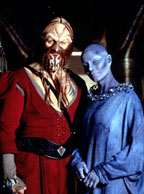May 31, 2005
Rejected Column Titles: "Kirk Wouldn't Stoop That Low", "Tea, Earl Grey, Hot," "Resistance is Futile," and "some sort of Locutus pun?" This one goes out to all the nerds in the hizz-ouse.
Holographic wowA Short History of Sci-Fi and Network Television
You may have noticed that there hasn't been a lot of science fiction on network television lately. And when there is, it can hardly be called science fiction -- it's often some other genre with a supernatural bent. This includes shows like Joan of Arcadia and Medium -- not really what the hardcore science fiction fans are looking for.
Yet science fiction is never completely absent from network TV: there's Smallville, and more recently Lost (which we can still only speculate is really a science fiction show) and Alias, which has sci-fi elements. But sci-fi shows clearly haven't been the flavor of the month in network-land for a while.
 |
The last time sci-fi had a real good network presence was around The X-Files peak, which is easily the last really successful network sci-fi show. In 1993, we had the premieres of Lois and Clark on ABC, Seaquest on NBC (both in the same time slot), and The X-Files and Brisco County Jr. on Fox. Not only was there sci fi on TV, there was also variety. While Brisco County Jr. was prematurely cancelled after one season, Lois and Clark ran for four, Seaquest for three, and The X-Files for a whopping nine. The X-Files also spawned a number of imitators and network interest in science fiction, all of which I liked, none of which lasted very long: Space: Above and Beyond, VR.5, Strange Luck, Harsh Realms, Earth2, and American Gothic. Some lasted a bit longer, like four seasons of The Pretender, three of Millennium, and two of Sliders before it moved to the Sci-Fi Channel.
 |
But what kind of science fiction will be waiting for sci-fi fans? Often the division is made between hard science fiction (that contains, like, actual science) and soft sci-fi (which doesn't). However, as very few TV shows are hard sci-fi, there should still be a term to distinguish the shows that are more heavy on the science fiction from the ones that are not. I will use the terms inclusive and exclusive. For instance, a show like Star Trek is exclusively science fiction, where Buffy and The X-files simply include science fiction.
| Twenty years ago, Babylon 5 would have shown on a network. Twenty years ago, Battlestar Galactica did, yet now the new incarnation does not. |
This disinterest in exclusive science fiction may be because of the relatively short TV life of even successful series (non-Star Trek). Yet, although the classic shows had relatively short runs on networks, they did run on networks. ABC had one season of Buck Rogers, four seasons of the Six Million Dollar Man, one season of The Bionic Woman, and one season of Battlestar Galactica. NBC had two seasons of Buck Rogers in the 25th Century, one season of The Bionic Woman, three seasons of Star Trek, one season of V, and four seasons of Quantum Leap. And CBS had three seasons of Lost In Space. And these shows were rather spaced out over the past 50 years. So we can't expect a big network show every year. But shows like Lost In Space and Battlestar Galactica are exclusive science fiction, the kind that, excepting Star Trek, doesn't really show on television anymore.
There are also the great anthology series which networks dust off and attempt to revamp about once a decade. But even in their prime The Twilight Zone ran for a very respectable six seasons on CBS and the Outer Limits ran for two on ABC.
After the failure of exclusive sci-fi shows in the mid-90s and the death of Star Trek, will there be exclusive science fiction on networks again? Last season when they created then dumped shows like Global Frequency and Dark Shadows, they seemed to be sending a message to science fiction. But looking at the slate for the upcoming year, it looks like its going to get another shot at the big time.
New shows for next season with a sci-fi or supernatural bent include CBS' The Ghost Whisperer and Threshold, ABC's Invasion and The Night Stalker, NBC's Fathom, and WB's Supernatural.
The Ghost Whisperer is just 'Medium' and Supernatural is about as sci-fi sounding as 'Charmed.' The Night Stalker will probably be less sci-fi than The X-Files. But Threshold, Invasion, and Fathom could border on actual science fiction. It's hard to know much about these shows from the one sentence descriptions released with the upfronts, but Fathom has creatures from under the sea, Threshold has a military-versus-aliens theme, and Invasion has alien body snatchers. They're not starships, but still promising. And shows about creature and alien invasion must be considered exclusive sci-fi. It's interesting that three 'invasion' shows are on the horizon. And Holographic Wow will certainly be keeping an eye on the new invasion trend and determining whether they satisfy what science fiction fans without cable are looking for.
Email the author.
All written content © 2005 by the authors. For more information, contact homer@smrt-tv.com
